As someone who’s been on a personal growth journey for years, I’ve explored numerous online learning platforms. Mindvalley has been a go-to for many, offering transformative courses on everything from mindfulness to entrepreneurship.
However, it’s premium pricing and specific focus may not suit everyone. Whether you’re looking for more budget-friendly options, or different course topics, or if you are just looking to explore what else is out there, this article will guide you through 12 top Mindvalley alternatives.
I’ll dive into the features, pros and cons, and pricing of each platform to help you find the perfect fit for your personal growth journey.
Let’s get into it.
Top 12 Mindvalley Alternatives: At A Glance
Before we get into the details, here’s a quick overview of the alternatives we’ll be discussing, along with their pricing and my personal rating based on features, content quality, research, and overall value:
| Platform | Starting Price | Rating (out of 5) |
|---|---|---|
| MasterClass | $10/month | 4.5 |
| Gaia | $13.99/month | 4.3 |
| Skillshare | $13.99/month (annual plan) | 4.2 |
| Udemy | Individual course pricing | 4.0 |
| Coursera | Free | 4.3 |
| edX | Free | 4.1 |
| FutureLearn | Free | 3.9 |
| CreativeLive | $13/month (annual plan) | 4.0 |
| The Great Courses Plus | $12.50/month (annual plan) | 3.8 |
| Khan Academy | Free | 4.2 |
| Pluralsight | $35/month | 3.9 |
| LinkedIn Learning | $19.99/month (annual plan) | 4.1 |
Mindvalley Alternatives: In Depth
Now that you have an idea of the alternatives and their pricing, let’s get into details of its features, pros and cons, and more.
1. MasterClass
As an enthusiast learner who always seeks inspiration from the best in their fields, I was immediately drawn to MasterClass. The platform brings together world-renowned experts to teach their craft, offering an unparalleled level of insight and inspiration. Imagine learning cooking from Gordon Ramsay, filmmaking from Martin Scorsese, or writing from Margaret Atwood – that’s the MasterClass experience.

What sets MasterClass apart is the star power of its instructors combined with Hollywood-level production quality. Each course feels like a beautifully crafted documentary series, making the learning experience both entertaining and enlightening. I’ve taken several classes, and while they may not always offer the same depth of practical instruction as some other platforms, the inspiration and insights gained are invaluable.
Features:
- High-production value video lessons
- Downloadable workbooks for each class
- Mobile and TV apps for on-the-go learning
- New classes added regularly
- Access to a community of learners
Pros:
- Learn from true masters in their fields
- Engaging and inspiring content
- Wide range of topics from arts to sports
- High-quality production that makes learning enjoyable
Cons:
- Limited interaction with instructors
- Higher price point than some alternatives
- May not provide in-depth, technical knowledge
Pricing: MasterClass Offers its users with three different plans: Standard, Plus and Premium. Its pricing starts from $10 per month and ranges to $20 per month.
2. Gaia
Formerly known as Gaiam, GAIA aims to empower the evolution of consciousness through alternative media. It is a subscription-based streaming service that offers a vast library of conscious living content, including yoga classes, meditation, documentaries, and original series.
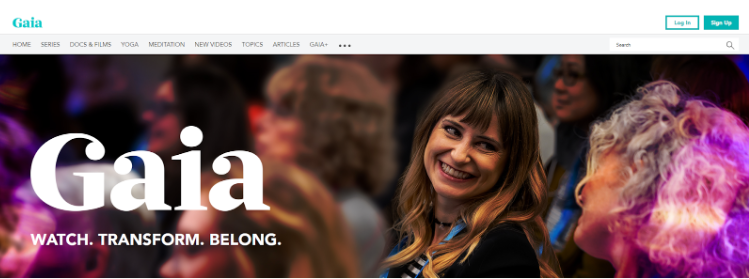
The platform provides over 8,000 ad-free titles covering topics such as spiritual growth, alternative healing, ancient civilizations, and personal development. GAIA’s content is designed to inspire, educate, and transform its users, catering to those interested in exploring mindfulness, yoga, and holistic living.
Features:
- Extensive library of yoga classes for all levels
- Guided meditation sessions
- Playlist feature to save favorite videos
- Offline viewing option
- Multi-device accessibility
- Ad-free streaming
- Original TV series and documentaries on spiritual and alternative topics
Pros:
- Wide variety of content beyond just yoga
- High-quality production value
- Affordable pricing compared to some competitors
- A 7-day free trial is available
Cons:
- No live classes are available
- Customer service issues reported by some users
- Different content available on the app vs. website
Pricing: Starts at $13.99 per month.
3. Skillshare
Skillshare has been my go-to platform for picking up creative and practical skills. Whether you’re into graphic design, writing, productivity hacks, or even culinary arts, Skillshare likely has a class for you.
What I love most is the project-based approach of Skillshare, where you’re not just watching videos but actively creating and sharing your work with a community of learners.

The platform’s strength lies in its diversity and accessibility. Classes are typically shorter and more focused than traditional courses, making it easy to fit learning into a busy schedule. I’ve taken classes on everything from digital illustration to creative writing, and I’ve always appreciated the practical, hands-on nature of the content.
Features:
- Thousands of classes across creative, business, and tech categories
- Project-based learning with class discussions
- Both long-form and short-form content available
- Offline viewing on mobile app
- Teacher interaction through project feedback
Pros:
- Affordable monthly subscription
- A wide variety of creative and practical skills are taught
- Active community for feedback and collaboration
- New classes are added weekly
- Great for both beginners and more advanced learners
Cons:
- Quality can vary between instructors
- Less structured than some other platforms
- No formal accreditation or certificates
Pricing: $13.99/month (billed annually)
4. Udemy
The variety of courses available allows you to find instruction on almost any imaginable topic. From coding and business skills to personal development and hobbies, Udemy’s catalog is vast and diverse.
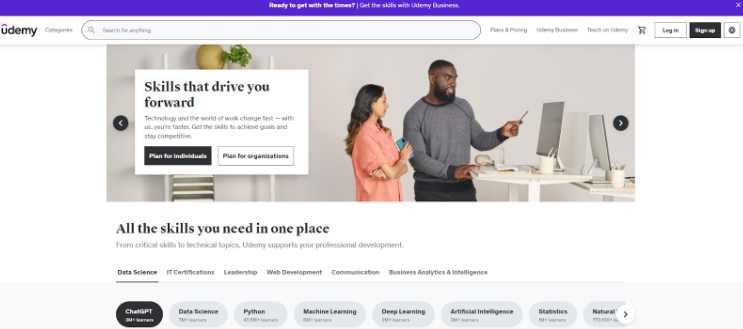
What I appreciate most about Udemy is its flexibility. You can purchase individual courses that interest you without committing to a subscription. Plus, with frequent sales, you can often snag high-quality courses for a fraction of their listed price. However, this open marketplace model also means that quality can vary significantly between courses, so it’s important to read reviews and preview content before purchasing.
Features:
- Over 185,000 courses on various topics
- Lifetime access to purchased courses
- Mobile app for on-the-go learning
- Instructor Q&A and student discussions
- Course completion certificates
Pros:
- Huge selection of courses
- One-time purchase model (no subscription required)
- Frequent sales and discounts
- 30-day money-back guarantee
- Learn at your own pace
Cons:
- Quality varies between courses
- Certificates may not be recognized by employers
Pricing: Individual course pricing, often ranging from $9.99 to $199.99 (frequent sales available)
5. Coursera
When I wanted to learn more about data science and machine learning, Coursera was my platform of choice. It partners with top universities and companies to offer courses, specializations, and even online degrees. The academic rigor is evident, making it great for serious learners looking for structured, in-depth education.
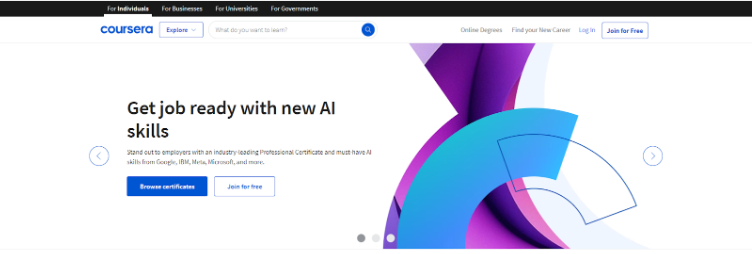
What sets Coursera apart is its blend of academic depth and practical skills. You’re not just learning theory, but you’re applying it through projects and assignments. I’ve completed several specializations on Coursera, and I’ve always been impressed by the quality of instruction and the applicability of the skills I’ve gained.
Features:
- University-level courses and specializations
- Certificates and online degrees available
- Peer-reviewed assignments
- Financial aid options
- Guided projects for hands-on learning
Pros:
- High-quality, structured learning from top institutions
- Mix of free and paid options
- Opportunity to earn recognized certificates and degrees
- In-depth, comprehensive courses
- Applicable to career advancement
Cons:
- Some courses have set start dates
- Less focus on creative or soft skills
- Some courses can be quite challenging
Pricing: Many courses are free to audit, certificates from $49, and specializations from $39-$79/month
6. edX
Similar to Coursera, edX offers university-level courses from prestigious institutions. I’ve found it particularly strong in STEM fields, but it also offers a good selection of humanities and business courses.
The ability to audit courses for free is a huge plus, allowing you to explore topics without financial commitment.

What I appreciate most about edX is its commitment to making high-quality education accessible. Whether you’re looking to explore a new subject, advance your career, or even earn a full degree online, edX provides the tools and resources to do so.
The platform’s MicroMasters programs are particularly innovative, bridging professional and academic worlds.
Features:
- Courses from top universities worldwide
- MicroMasters and Professional Certificate programs
- Self-paced and instructor-led options
- Verified certificates available
- Some courses offer college credit
Pros:
- High-quality, structured academic content
- Many courses are free to audit
- Option to pursue credit-eligible programs
- Strong in STEM and computer science
- Flexible learning options
Cons:
- Certificates and credit-eligible programs can be expensive
- Can be challenging for beginners in some subjects
Pricing: Many courses are free to audit, and varying prices for credit-eligible programs.
7. FutureLearn
FutureLearn offers a nice balance between academic seriousness and accessibility. I appreciate their focus on social learning. The discussions and peer interaction add a lot to the experience.
They also have a good selection of courses from UK and international universities, providing a global perspective on various subjects.
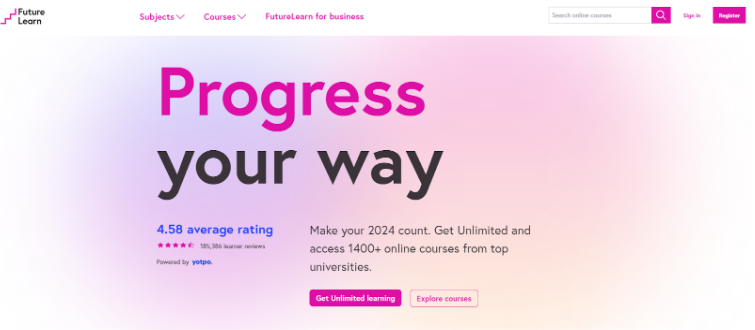
What stands out about FutureLearn is its emphasis on narrative-driven learning. Courses are structured as stories, making complex topics more engaging and easier to follow.
Some of the features I enjoyed the most with FutureLearn are clear, week-by-week progression and the opportunity to engage with fellow learners from around the world.
Features:
- Short courses, in-depth programs, and online degrees
- Social learning with peer discussions
- Mobile-friendly platform
- Option to purchase certificates
- Partnerships with global institutions and industry leaders
Pros:
- Diverse course offerings from global institutions
- Emphasis on collaborative learning
- Clear weekly structure to courses
- Mix of free and premium content
- Courses on contemporary issues and emerging fields
Cons:
- Limited advanced tech or data science offerings
- Fewer US-based university partners
- Premium content can be expensive
Pricing: Many courses are free to access, unlimited access from $29.17/month (billed annually), varying prices for degrees
8. CreativeLive
For creative professionals or hobbyists, CreativeLive is a gem. The platform focuses on creative fields like photography, design, music, and crafts, offering both live-streamed and on-demand classes.

What I love about CreativeLive is the practical, hands-on nature of its courses. You’re learning from working professionals who share techniques and real-world insights about building a career in creative fields.
The live classes add an element of excitement and immediacy to the learning experience, though all classes are also available on-demand.
Features:
- Live-streamed classes with real-time Q&A
- On-demand library of recorded courses
- Taught by working professionals in creative fields
- Downloadable course materials
- Mobile app for on-the-go learning
Pros:
- High-quality instruction in creative niches
- Mix of beginner to advanced level courses
- Option to watch free live-streamed classes
- Practical, skill-based learning
- Supportive community of creatives
Cons:
- Limited offerings outside of creative fields
- Can be pricey if purchasing individual courses
- Less academic or certificate-focused than some alternatives
Pricing: $13/month (billed annually) or $39/month (monthly plan), individual courses also available for purchase
9. The Great Courses Plus
I turn to The Great Courses Plus when I’m in the mood for in-depth, lecture-style learning. It feels like auditing college courses from top professors, covering everything from history and science to philosophy and cooking. The depth and breadth of content here is impressive.

What sets The Great Courses Plus apart is its content’s academic level and accessibility. These aren’t watered-down versions of college courses; they’re comprehensive explorations of subjects but presented in a way that’s engaging for lifelong learners. I’ve particularly enjoyed their history and science courses, which have given me new perspectives on topics I thought I knew well.
Features:
- College-level courses on a wide range of subjects
- Audio and video formats available
- New courses added monthly
- Downloadable content for offline viewing
- Supplementary materials like PDF guidebooks
Pros:
- High-quality, in-depth content
- Wide range of academic and practical subjects
- No tests or assignments (great for casual learners)
- Both audio and video options for flexible learning
- Lifetime access to purchased courses
Cons:
- No certificates or accreditation
- Can feel more like passive learning
Pricing: $20/month (billed monthly) or $15/month (quarterly plan), $12.50/month (Annual Plan).
10. Khan Academy
Khan Academy holds a special place in my heart. It helped me brush up on math skills I’d long forgotten. The best part? It’s completely free.
While it’s especially strong in STEM subjects, it also offers courses in arts and humanities, making it a comprehensive resource for learners of all ages.

What I admire most about Khan Academy is its mission to provide free, world-class education for anyone, anywhere. The step-by-step approach to teaching complex subjects, particularly in math and science, is incredibly effective.
While it may not offer the same level of depth as some paid platforms for advanced topics, it’s an invaluable resource for building a strong foundation in many subjects.
Features:
- Completely free educational content
- Courses for all ages, from elementary to college level
- Practice exercises and quizzes
- Personalized learning dashboard
- Instructional videos and articles
Pros:
- High-quality, structured learning at no cost
- Strong in math and sciences
- Adaptive technology to personalize learning
- No ads or paywalls
- Great for students and lifelong learners alike
Cons:
- Less advanced content in some areas
- Less suited for professional development
Pricing: Free
11. Pluralsight
I’ve used Pluralsight to keep my coding skills sharp and explore new technologies. The skills assessments are particularly helpful in identifying areas for improvement and tailoring your learning path.
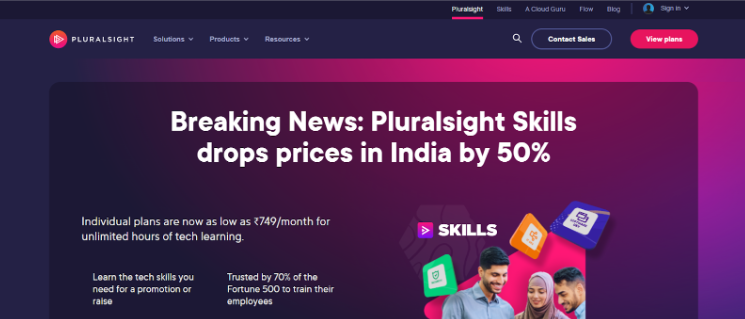
What sets Pluralsight apart is its focus on cutting-edge technology skills. The content is consistently up-to-date, which is crucial in the fast-moving tech world. I’ve found their paths and skill assessments beneficial for structuring my learning and tracking my progress.
While it’s not for everyone, for those in or aspiring to tech careers, it’s an invaluable resource.
Features:
- Focuses on technology and developer courses
- Skill assessments and personalized learning paths
- Interactive courses and projects
- Certificates of completion
- Hands-on learning environments
Pros:
- Comprehensive coverage of tech and IT topics
- High-quality, up-to-date content
- Skill IQ assessments to gauge your level
- Strong focus on practical, job-relevant skills
- Good for both beginners and advanced learners in tech
Cons:
- Limited offerings outside of tech fields
- It can be overwhelming for complete beginners
- Less community interaction than on some platforms
Pricing: $35/month for a personal Basic Plan or $47/month for a Personal Plus Plan
12. LinkedIn Learning
Formerly Lynda.com, LinkedIn Learning offers a broad range of professional development courses. I find it particularly useful for brushing up on business and software skills.
The integration with LinkedIn profiles is a nice touch for showcasing your learning to potential employers or clients.
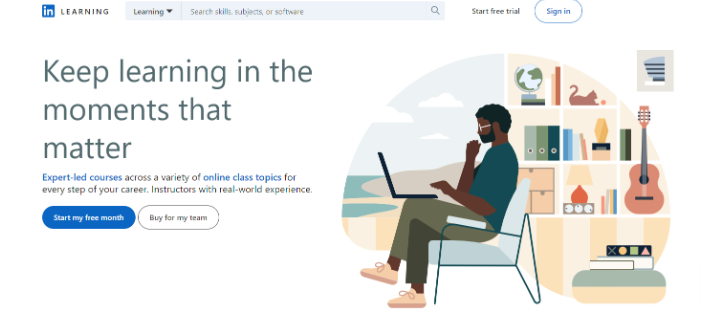
What I appreciate about LinkedIn Learning is its focus on practical, career-oriented skills. Whether you’re looking to advance in your current role or pivot to a new career, you’ll likely find relevant courses here.
The quality is generally high, though it can vary between instructors. The platform’s recommendation engine is also quite good at suggesting relevant courses based on your career interests and learning history.
Features:
- Wide range of business, creative, and technology courses
- Personalized course recommendations
- Certificates can be added to the LinkedIn profile
- Offline viewing available
- Exercise files for hands-on practice
Pros:
- Quality instruction in professional skills
- New courses are added weekly
- Integration with LinkedIn for networking
- A mix of short, skill-based courses and in-depth learning paths
- Certificates that can enhance your professional profile
Cons:
- Some may find the LinkedIn integration intrusive
- It may not be as comprehensive in some areas as specialized platforms
Pricing: $19.99/month (annual plan) or $39.99/month (monthly plan)
How To Choose The Right Mindvalley Alternative
When selecting an alternative to Mindvalley, you can consider these factors:
- Learning goals: Are you looking for personal development, professional skills, or academic knowledge?
- Budget: Consider both subscription models and one-time purchase options.
- Time commitment: Some platforms offer short, bite-sized lessons while others have more in-depth courses.
- Learning style: Do you prefer video lectures, interactive exercises, or project-based learning?
- Certification needs: If you’re looking to boost your resume, consider platforms offering recognized certificates.
- Subject areas: Ensure the platform covers the topics you’re most interested in learning.
Tips For Making The Best Decision
Here are some tips that will help you choose the best alternative for Mindvalley that may suit your needs the best:
- Take advantage of free trials or free plans to test out platforms
- Read user reviews and watch sample lessons before committing
- Consider mixing and matching platforms for a well-rounded learning experience
- Don’t be afraid to switch if a platform isn’t meeting your needs
Related Reads:
Conclusion: MasterClass Is The Best Alternative To Mindvalley
Just like MindValley MasterClass, it will help you to get better in your personal life and its different aspects.
Apart from that, my other three top picks are:
- Gaia: Focuses on mental and spiritual growth.
- Skillshare: Helps to level up creative skills.
- Coursera: Ideal to boost academics and career.
However, from the star-studded lineup of MasterClass to the academic rigor of Coursera and edX, there’s truly something for every type of learner. Whether you’re looking to develop creative skills with Skillshare or CreativeLive, dive into tech with Pluralsight, or explore a bit of everything with platforms like Udemy or LinkedIn Learning, the options are endless.
Remember, the best platform for you depends on your personal goals, learning style, and budget. Don’t be afraid to experiment with different options to find your perfect fit. Happy learning!